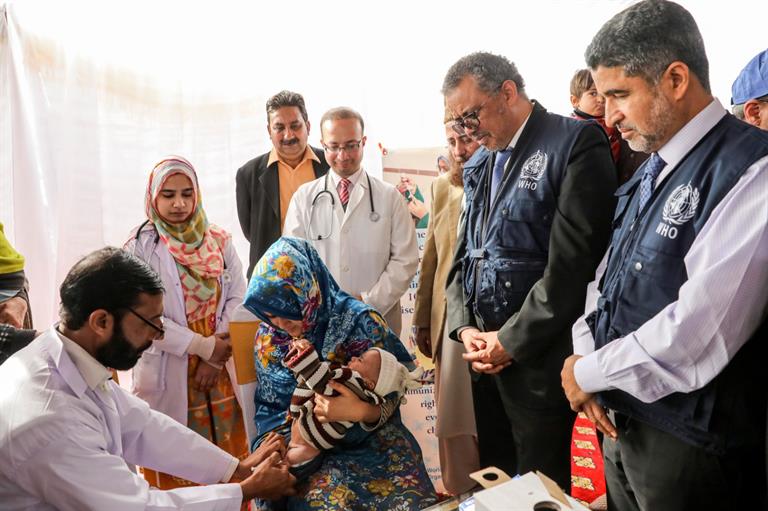As recently as 30 years ago, wild poliovirus paralysed more than 350 000 children in more than 125 countries every year. Today, the virus has been beaten back to less than 30 reported cases in 2018 in just two countries – Afghanistan and Pakistan – and the world stands on the cusp of an unprecedented public health success: the global eradication of a human disease for only the second time in history.
WHO and partners in the Global Polio Eradication Initiative are committed to fully support the Governments of Afghanistan and Pakistan to tackle polio in its last strongholds and get rid of this debilitating disease for good.
WHO Director-General visited Afghanistan, calling for continued efforts on polio eradication and health financing.

Dr Tedros Adhanom Ghebreyesus was in Pakistan to support efforts in vaccinating all children against polio.
WHO/A. Zaidi
Polio eradication requires high immunization coverage everywhere, worldwide, to block transmission of this extremely contagious virus. Unfortunately, children are still missing out on vaccination for various reasons including lack of infrastructure, remote locations, population movement, conflict and insecurity and resistance to vaccination.

Abdhul Rahman, polio vaccination volunteer, gives oral polio vaccine to an Afghan boy on a busy street.
WHO/G. Elham
The aim of the teams on the ground in Afghanistan and Pakistan is very clear: find and vaccinate every child before the virus reaches them. They have made tremendous progress. Twenty years ago, poliovirus paralysed more than 30 000 children across Pakistan. In 2018, just 8 cases were reported from a handful of districts.
But eradication is an ‘all or nothing’ effort. Because the virus is so highly infectious, failure to eradicate polio from these last remaining strongholds could result in a resurgence of the disease, with as many as 200 000 new cases worldwide every year, within 10 years.
Polio vaccination teams cross the Indus River to reach remote communities in Pakistan.
WHO/A. Zaidi
That is why the Governments of Pakistan and Afghanistan have mobilized every sector of public and civil society, every community and religious leader, every vaccinator, every mother and father, to eradicate this disease once and for all.
“There is no reason why we should not be able to finish this job, we are nearly there,” says Professor Helen Rees, Chair of the Emergency Committee on Polio Eradication under the International Health Regulations (IHR). “But we have to keep at it. We have achieved this before with smallpox. The world is a much better place without smallpox. If we stop what we are doing, we could go back to a situation where we have 200 000 or 300 000 children paralysed every year.”
Volunteer vaccinators are trained to use tally sheets to track vaccination outreach in Afghanistan.
WHO/H. Tuuli
WHO and partners are committed to helping countries achieve this success.
On 1 January 2019, WHO Director-General Dr Tedros Adhanom Ghebreyesus took over the Chair of the Polio Oversight Board, which guides and oversees the Global Polio Eradication Initiative, as a clear sign that the eradication of this disease is a priority for the organization.
Afghan children show their fingers marked to indicate they have been vaccinated against polio
WHO/J. Jalali
Everything is in place to achieve success. A polio-free Pakistan and Afghanistan means a polio-free world. Economic modelling has found that the eradication of polio would save at least US$ 40-50 billion, mostly in low-income countries. And the humanitarian benefits will be sustained for future generations: no child would ever again be affected by this terrible disease.





